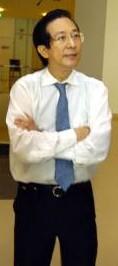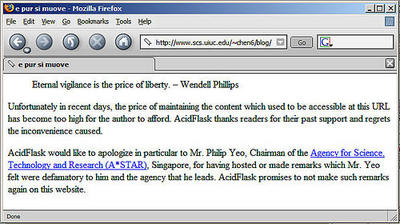Following is the official position on "party political film" as commented by a lawyer who has taken it down from his blog. To protect his identity, the comments have been suitably modified, but the meaning should be obvious to the casual reader:
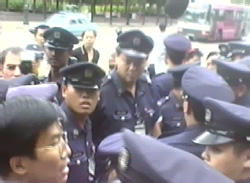 In 1998, the Films Act was amended to introduce the concept of "party political films". (Prior to that, the only other category of films that the Films Act specifically referred to by subject-matter was "obscene films"). Essentially, no one is allowed to import, make, reproduce or exhibit any party political film. This means any film:
In 1998, the Films Act was amended to introduce the concept of "party political films". (Prior to that, the only other category of films that the Films Act specifically referred to by subject-matter was "obscene films"). Essentially, no one is allowed to import, make, reproduce or exhibit any party political film. This means any film:1. which is an advertisement made by or for any political party in Singapore, or any organisation whose focus is mainly on Singapore's politics; or
2. which is made by any person and which is directed towards any political end in Singapore.
In turn, the phrase "directed towards any political end in Singapore" is further defined as follows:
For the purposes of this Act, a film is directed towards a political end in Singapore if the film —
(a) contains wholly or partly any matter which is intended or likely to affect voting in any election or national referendum in Singapore; or
(b) contains wholly or partly either partisan or biased references to or comments on any political matter, including but not limited to any of the following:
(i) an election or a national referendum in Singapore;
(ii) a candidate or group of candidates in an election;
(iii) an issue submitted or otherwise before electors in an election or a national referendum in Singapore;
(iv) the Government or a previous Government or the opposition to the Government or previous Government;
(v) a Member of Parliament;
(vi) a current policy of the Government or an issue of public controversy in Singapore; or
(vii) a political party in Singapore or any body whose objects relate wholly or mainly to politics in Singapore, or any branch of such party or body.
Note the magic words "including but not limited to". This means that you don't necessarily have to fall into the examples listed from (i) to (vii) to run foul of the law. As long as you make a film that comments on any political matter (even if not mentioned in the (i)-to(vii) list), you have made a party political film and you have committed a crime.
Note also the legal definition of film under the Films Act. "Film" isn't limited to the kind of show you typically associate with a film festival or a trip to a Golden Village cinema. Under the Films Act, "film" means:
(a) any cinematograph film;
(b) any video recording, including a video recording that is designed for use wholly or principally as a game;
(c) any other material record or thing on which is recorded or stored for immediate or future retrieval any information that, by the use of any computer or electronic device, is capable of being reproduced or displayed as wholly or partly visual moving pictures,
and includes any part of a film, and any copy or part of a copy of the whole or any part of a film
Conceivably, any tiny segment video recording, for example, even 7 seconds of comedic footage showing a Minister hanging out in a gay bar, could be a party political film. And it would be a criminal offence to make such a video.
So just how can the official television station TCS even feature PAP politicians on the 9 o'clock news without technically committing an offence?
The clever folks in Parliament already thought of that. So they snuck in this clever little provision:
For the avoidance of doubt, any film which is made solely for the purpose of reporting of current events is not a party political film.
Well then, you may think that apart from the news, the PAP won't be allowed to use film media to spread any of its own messages.
Don't worry, those little problems are all taken care of. (It's really quite easy to make laws exactly the way you want them to be, if you hold 79 out of 81 seats in Parliament). Section 40 of the Films Act says:
"This Act shall not apply to any film sponsored by the Government."
That is, any film sponsored by the Singapore government is perfectly fine, even if it contains obscene material or explicit political content. And as if that wasn't enough, they also put this in the Act:
"The Minister may, subject to such conditions as he thinks fit, exempt any person or class of persons or any film or class of films from all or any of the provisions of this Act."
So any film can be exempted if the Minister likes the film. In other words, even if a film is bursting with political messages, the Minister can still allow the film to be imported, sold, distributed and exhibited - no problems whatsoever - as long as the Minister likes those political messages.
On the other hand, what do you think are the chances of any PAP Minister liking Martyn See's film?
Aftermath:
On 25th Aug 2005 Singapore police asked Martyn See to surrender the video camera and tapes he used to make the documentary on opposition figure Chee Soon Juan as part of its investigation for possible breach of film laws. Martyn told Reuters the demand was made after he had been questioned for three hours at a police station on Thursday. It was the second time Singapore authorities interviewed him about the 26-minute documentary he withdrew from the city-state's annual film festival in March under pressure from government censors.
"The questions were more political than last time and I think they were intended to find out about my political affiliation," he said.
Here are a sample of some of the questions which totalled about 60:
When asked what inspired you to make this film, you claimed that political opposition in Singapore is marginalised. What do you mean by "marginalised?"
What in your opinion should the media do?
So you mean that the Singapore media is being unfair to political opposition?
You claimed that you took two and a half years to make the film. So is it normal for filmmakers to take such such a period to make a 26 minute film?
What sort of activities of Chee Soon Juan were you waiting that you think was worth shooting?
You mentioned that a friend of yours named Peter did the voiceover for the film? Is he contactable?
You mentioned that you edited the film on a friend's Macintosh laptop. Is he contactable?
How was the item (laptop) passed to you and how was it returned to him?
Did you save any of the footages in his computer?
Do you own a computer now?
There were some newspaper articles on your blog? How did you secure those articles?
In your film, there were footages of Chee Soon Juan making speeches at a election rally. Where did you secure the footage?
Did you duplicate the video before returning?
Why was the election rally audio muted?
When did you know that Singapore Rebel was classified a party political film?
I am informing you that Lesley Ho's (of Singapore International Film Festival) email dated March 2005 had mentioned that Philip (co-director of SIFF) was told that Singapore Rebel was objectionable pertaining to party political films. You were told that if you did not withdraw the film, the "full extent of the law" will apply. What do you have to say to that?
So you agree that at this stage when you read Lesley's email, you knew that Singapore Rebel was classified as a party political film?
Since you knew that the film "may have been" a party political film at that stage, why would you want to circulate the film to overseas film festivals?
Can you recall participating in any activities organised by any political party in Singapore?
(Somewhere at this point of the interview, I told ASP Chan that I would walk out if questions continue along this line).
Did Chee Soon Juan direct you to do the filming on May Day (arrests of 2002)?
On 19th July, 2005, Chee Soon Juan and some members was speaking at Speakers Corner? Were you there to film the event? Who directed you to film the event?
On August 11, 2005, were you present in front of CPF Building when Chee Soon Juan and other SDP members gathered for a protest?
Did you contact Chee Soon Juan after the video interview on Singapore Rebel?
Are you still in contact with Chee Soon Juan now?
I do not want to go to your house. Are you able to produce to the police the following items?
1) Two remaining copies of Singapore Rebel
2) Receipts from courier services of you mailing the film to New Zealand and USA (as mentioned in your earlier statement)
3) The Samsung mini-DV camera you used to make Singapore Rebel, and
4) Any raw footages of Singapore Rebel before the editing.
Update: Aug 30, 2005
Mr Yap Keng Ho, an activist in Singapore, made a police report today against CNA. Uncle Yap is asking the police to look into two programmes produced and aired by the state-controlled local broadcaster ChannelNewsAsia or CNA, Success Stories and Up Close. These programmes can also be considered "party political films" under the Films Act.
Mr Yap made the report at the Tampines Neighbourhood Police Centre today, citing that two films, "Success Story" which portrayed Mr Lee Kuan Yew and "Up Close" which featured five PAP ministers including Mr Lee Hsien Loong, were screened on Channel News Asia in 2002 and 2005 respectively.
The complaint comes at a time when the police are investigating Mr Martyn See for making a film about Dr Chee Soon Juan, which the Media Development Authority has said is political in nature and therefore a violation of the Films Act.
Mr Yap said in his report that the screening of the political documentaries of Mr Lee Kuan Yew and the PAP ministers likewise contravened the Films Act and has asked the police to investigate the matter.
 Following is the text of the letter from Singapore's Attorney General to Law Minister S. Jayakumar on the presence of unauthorised persons inside polling stations. The opinions in this letter were put forward in Parliament in reply to Opposition MP J.B. Jeyaratnam's queries on July 30:
Following is the text of the letter from Singapore's Attorney General to Law Minister S. Jayakumar on the presence of unauthorised persons inside polling stations. The opinions in this letter were put forward in Parliament in reply to Opposition MP J.B. Jeyaratnam's queries on July 30: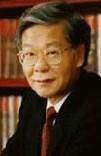
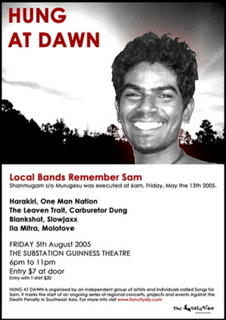 Months later, organisers of the concert Hung at Dawn, targeting the death penalty in Singapore, were told by the police they will not be given a permit unless they remove a photo of the late Mr Shanmugam on its posters. Mr Shamugam's photograph adorned the posters that the arts community have used to promote the anti-death penalty concert which was to be held at the Substation on 5 August 2005.
Months later, organisers of the concert Hung at Dawn, targeting the death penalty in Singapore, were told by the police they will not be given a permit unless they remove a photo of the late Mr Shanmugam on its posters. Mr Shamugam's photograph adorned the posters that the arts community have used to promote the anti-death penalty concert which was to be held at the Substation on 5 August 2005.